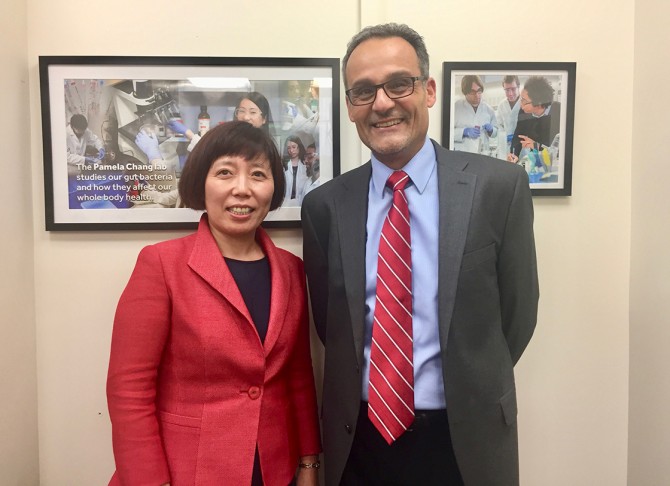FastTrack paves path for physical science, engineering startups
By Tom Fleischman
A program launched over the summer by the Center for Technology Licensing (CTL) is expected to offer ventures based on Cornell technologies in engineering and the physical sciences a smoother road from lab to market.
The FastTrack Startup License program takes an innovative approach to helping Cornell-affiliated entrepreneurs by providing a rapid and transparent licensing process, thanks to a “ready-to-be-executed” licensing agreement, limited need for negotiation and options based on the type of business plan being set forth.
“Technology transfer into industry is definitely an aspiration for any university, and it is something I was very keen on when I came into this office,” said Emmanuel Giannelis, vice provost for research and vice president for technology transfer, intellectual property and research policy. Giannelis, the Walter R. Read Professor of Engineering in materials science and engineering, started in his administrative roles in July 2017.
“What we heard from faculty and potential business partners and others,” Giannelis said, “is that there was a rather lengthy process for someone who wanted to commercialize our technologies. The aim of FastTrack is to basically make this process more efficient. With any new company, time is of the essence.”
“We want to support startups and have our technologies utilized by society,” said Alice Li, executive director of CTL. “It’s becoming more and more of a priority for us to do technology commercialization through venture creation, and support economic development locally, regionally and nationally. Reducing the time and expense of the licensing process for our entrepreneurs allows them to focus more of their precious early stage resources on developing the technology and company.”
The main features of the FastTrack program, launched in July, are:
- A pre-set agreement with mutually favorable, balanced and fixed terms;
- Minimal negotiation, focused mainly on the licensed technology’s field of use and on a timeline for reaching milestones on the road to commercialization;
- A menu of options designed to accommodate different types of businesses, from those geared toward venture capital funding, to those focused on strategic partnerships, to bootstrapped efforts.
- Minimized early stage cost to help startups reserve cash for development.
The program offers a streamlined and transparent path to commercialization for budding entrepreneurs in engineering and physical sciences, disciplines that due to less stringent regulations typically have a more direct route to commercialization than medical devices, therapeutics, agriculture and other areas.
Participants in the program must have a viable team of founders and advisers committed to the idea, a value proposition for the market and a plan for hitting key development milestones.
If a startup’s technology is not yet at the licensing stage, the company can sign up for a six-month term (with an option for a six-month extension, at CTL’s discretion), during which it will be expected to work with regional incubators, business accelerators and/or other training programs to sharpen its business concept.
“I think the main benefit of the program is to students, postdocs, faculty and alumni who are pursuing their first entrepreneurship experience,” said David Erickson, the Sibley College Professor of Mechanical Engineering and associate dean for research in the College of Engineering. “Licensing terms are often opaque and difficult to parse; this makes them much more open and accessible.”
Greg Galvin, M.S. ’82, Ph.D. ’84, MBA ’93, serial entrepreneur and founder of a company based on Cornell technology (Kionix), agreed.
“Having a pre-set template lets the entrepreneur know up front the broad terms of the deal,” he said, “and takes a lot of the negotiation out of it, which is part of why it’s faster. You also take the uncertainty out of it, so the entrepreneur can look at the terms and say, ‘Geez, I can’t sign up for that’ or, hopefully, ‘Yes, that works for me.’”
Recalling his own experience with licensing his Cornell-based technology more than 25 years ago, Galvin said the main benefit is clear: “It’s in the title itself – fast.”
CTL consulted with Galvin as it was developing the FastTrack program. “Historically, negotiating licenses with Cornell has not been a quick process. For a young company just starting, time is usually their enemy, because you’re burning through your money while you’re not producing something.
“So the sooner you can get license deals and other things of that nature done,” he said, “the better for the company.”
Giannelis is confident that FastTrack presents entrepreneurs with Cornell’s “best offer” in an agreement that’s beneficial to all parties.
In addition to FastTrack, CTL is also preparing an online startup guide – a how-to for budding entrepreneurs – which Li expects will be released this fall.
Media Contact
Get Cornell news delivered right to your inbox.
Subscribe

